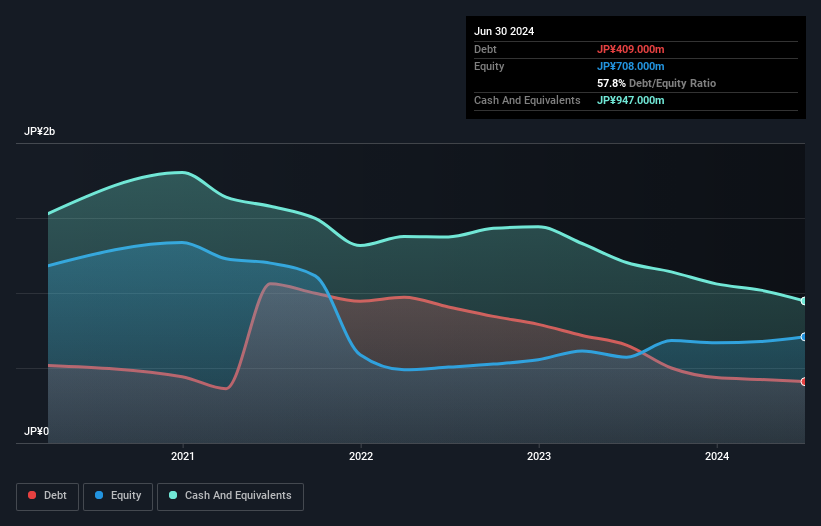The external fund manager backed by Berkshire Hathaway's Charlie Munger, Li Lu, makes no bones about it when he says 'The biggest investment risk is not the volatility of prices, but whether you will suffer a permanent loss of capital.' When we think about how risky a company is, we always like to look at its use of debt, since debt overload can lead to ruin. Importantly, logly,Inc. (TSE:6579) does carry debt. But is this debt a concern to shareholders?
When Is Debt Dangerous?
Debt and other liabilities become risky for a business when it cannot easily fulfill those obligations, either with free cash flow or by raising capital at an attractive price. Ultimately, if the company can't fulfill its legal obligations to repay debt, shareholders could walk away with nothing. While that is not too common, we often do see indebted companies permanently diluting shareholders because lenders force them to raise capital at a distressed price. Of course, debt can be an important tool in businesses, particularly capital heavy businesses. The first step when considering a company's debt levels is to consider its cash and debt together.
See our latest analysis for loglyInc
What Is loglyInc's Net Debt?
As you can see below, loglyInc had JP¥409.0m of debt at June 2024, down from JP¥653.0m a year prior. But it also has JP¥947.0m in cash to offset that, meaning it has JP¥538.0m net cash.

A Look At loglyInc's Liabilities
Zooming in on the latest balance sheet data, we can see that loglyInc had liabilities of JP¥625.0m due within 12 months and liabilities of JP¥174.0m due beyond that. Offsetting these obligations, it had cash of JP¥947.0m as well as receivables valued at JP¥157.0m due within 12 months. So it actually has JP¥305.0m more liquid assets than total liabilities.
This surplus suggests that loglyInc is using debt in a way that is appears to be both safe and conservative. Due to its strong net asset position, it is not likely to face issues with its lenders. Succinctly put, loglyInc boasts net cash, so it's fair to say it does not have a heavy debt load! When analysing debt levels, the balance sheet is the obvious place to start. But it is loglyInc's earnings that will influence how the balance sheet holds up in the future. So when considering debt, it's definitely worth looking at the earnings trend. Click here for an interactive snapshot.
In the last year loglyInc had a loss before interest and tax, and actually shrunk its revenue by 29%, to JP¥1.9b. That makes us nervous, to say the least.
So How Risky Is loglyInc?
Statistically speaking companies that lose money are riskier than those that make money. And the fact is that over the last twelve months loglyInc lost money at the earnings before interest and tax (EBIT) line. And over the same period it saw negative free cash outflow of JP¥123m and booked a JP¥50m accounting loss. While this does make the company a bit risky, it's important to remember it has net cash of JP¥538.0m. That means it could keep spending at its current rate for more than two years. Overall, its balance sheet doesn't seem overly risky, at the moment, but we're always cautious until we see the positive free cash flow. The balance sheet is clearly the area to focus on when you are analysing debt. However, not all investment risk resides within the balance sheet - far from it. To that end, you should be aware of the 1 warning sign we've spotted with loglyInc .
At the end of the day, it's often better to focus on companies that are free from net debt. You can access our special list of such companies (all with a track record of profit growth). It's free.
Valuation is complex, but we're here to simplify it.
Discover if loglyInc might be undervalued or overvalued with our detailed analysis, featuring fair value estimates, potential risks, dividends, insider trades, and its financial condition.
Access Free AnalysisHave feedback on this article? Concerned about the content? Get in touch with us directly. Alternatively, email editorial-team (at) simplywallst.com.
This article by Simply Wall St is general in nature. We provide commentary based on historical data and analyst forecasts only using an unbiased methodology and our articles are not intended to be financial advice. It does not constitute a recommendation to buy or sell any stock, and does not take account of your objectives, or your financial situation. We aim to bring you long-term focused analysis driven by fundamental data. Note that our analysis may not factor in the latest price-sensitive company announcements or qualitative material. Simply Wall St has no position in any stocks mentioned.
About TSE:6579
loglyInc
Operates in the media technology, ad technology, and data marketing businesses in Japan.
Excellent balance sheet and slightly overvalued.
Market Insights
Community Narratives


Recently Updated Narratives


Engineered for Stability. Positioned for Growth.


MINISO's fair value is projected at 26.69 with an anticipated PE ratio shift of 20x


Fiverr International will transform the freelance industry with AI-powered growth
Popular Narratives


MicroVision will explode future revenue by 380.37% with a vision towards success


NVDA: Expanding AI Demand Will Drive Major Data Center Investments Through 2026



